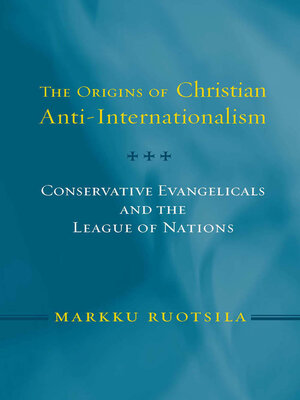The Origins of Christian Anti-Internationalism
ebook ∣ Conservative Evangelicals and the League of Nations · Religion and Politics series
By Markku Ruotsila

Sign up to save your library
With an OverDrive account, you can save your favorite libraries for at-a-glance information about availability. Find out more about OverDrive accounts.
Find this title in Libby, the library reading app by OverDrive.



Search for a digital library with this title
Title found at these libraries:
| Library Name | Distance |
|---|---|
| Loading... |
The roots of conservative Christian skepticism of international politics run deep. In this original work Markku Ruotsila artfully unearths the historical and theological origins of evangelical Christian thought on modern-day international organizations and U.S. foreign policy, particularly in the fierce debates over the first truly international body—the League of Nations.
After describing the rise of the Social Gospel movement that played a vital, foundational role in the movement toward a League of Nations, The Origins of Christian Anti-Internationalism examines the arguments and tactics that the most influential confessional Christian congregations in the United States—dispensational millenialists, Calvinists, Lutherans, and, to a lesser extent, Methodists, Episcopalians, and Christian Restorationists—used to undermine domestic support for the proposed international body. Ruotsila recounts how these groups learned to co-opt less religious-minded politicians and organizations that were likewise opposed to the very concept of international multilateralism. In closely analyzing how the evangelical movement successfully harnessed political activism to sway U.S. foreign policy, he traces a direct path from the successful battle against the League to the fundamentalist-modernist clashes of the 1920s and the present-day debate over America's role in the world.
This exploration of why the United States ultimately rejected the League of Nations offers a lucid interpretation of the significant role that religion plays in U.S. policymaking both at home and abroad. Ruotsila's analysis will be of interest to scholars and practitioners of theology, religious studies, religion and politics, international relations, domestic policy, and U.S. and world history.







